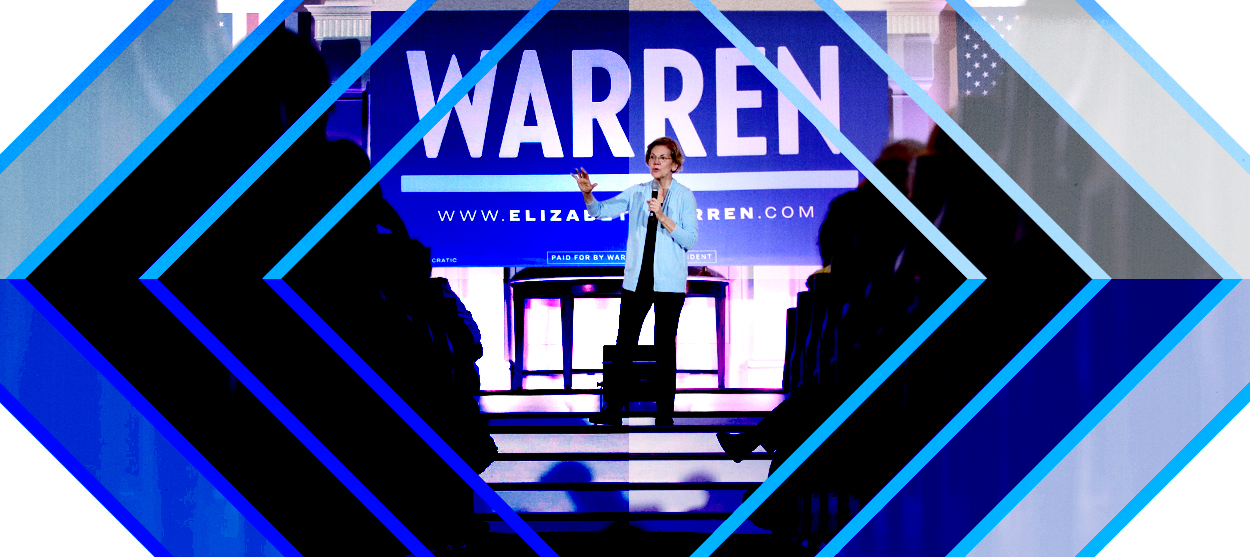Elizabeth Warren is not going anywhere
Why her presidential campaign, even after its end, will continue to have reverberating effects


A free daily email with the biggest news stories of the day – and the best features from TheWeek.com
You are now subscribed
Your newsletter sign-up was successful
Well, we have our answer. Not even three months into 2020, it turns out that America's misogyny is, indeed, an immovable object. With Sen. Elizabeth Warren's (D-Mass.) departure from the presidential race, Democratic voters are back in dispiritingly familiar territory: choosing between two front-runners who are both elderly, white-privileged men.
We have had a respite from this particular state of affairs since 2008. Perhaps it was foolish to think that it would last. Overall, both the news media and the electorate that consumes it seem to have decided that the stakes are too high, and the status quo too powerful, to throw our weight behind a non-default candidate. How else to explain the winnowing of a crowded and stunningly diverse candidate field — including no fewer than six female candidates — to this?
There is a lot being written right now about the barriers faced by the Warren campaign, and what those barriers say about our country's attitudes towards smart, ambitious women. Even among my social circle — predominantly white, college-educated, liberal, precisely the sort of voters Warren connected with — there was a sense of fatalism masquerading as pragmatism throughout her entire run. As I debriefed with my friends today, it was clear that those of us who dared to hope have been rewarded with crushing disappointment. Again.
The Week
Escape your echo chamber. Get the facts behind the news, plus analysis from multiple perspectives.

Sign up for The Week's Free Newsletters
From our morning news briefing to a weekly Good News Newsletter, get the best of The Week delivered directly to your inbox.
From our morning news briefing to a weekly Good News Newsletter, get the best of The Week delivered directly to your inbox.
To judge by the public discourse around the end of Warren's campaign, you might think she'd died and was in the process of being eulogized. That is not the case at all. Elizabeth Warren, politician, force of nature, is not going anywhere. She still has plenty to do on the national stage. And her presidential campaign, even after its end, will continue to have reverberating effects. As she said to her campaign staff:
"We have shown that it is possible to build a grassroots movement that is accountable to supporters and activists and not to wealthy donors … We also advocated for fixing our rigged system in a way that will make it work better for everyone — regardless of your race, or gender, or religion, regardless of whether you're straight or LGBTQ+. And that wasn't an afterthought, it was built into everything we did."
So we are not mourning Warren's political career, which remains vital in every sense of the word. But we are mourning what Elizabeth Warren, 2020 presidential candidate, represented: a rare chance for those fighting for a seat at the American political table to feel like our voices were being heard.
For too long, the Democratic Party has counted on the support of marginalized communities while doing relatively little to court their goodwill. Female voters, voters of color, queer voters, disabled voters, and so on down the intersectional line, all have had to play second fiddle to the concerns of the middle-American white male. When candidates do acknowledge the challenges that marginalized voters face, it's almost always too vague or openly pandering to be trusted.
A free daily email with the biggest news stories of the day – and the best features from TheWeek.com
Even for women like me — white-privileged, straight and cisgender, relatively able-bodied, socioeconomically well-off — it often feels like the best we can hope for is that things won't get actively worse for us under a Democratic president. Neither Joe Biden nor Sen. Bernie Sanders (I-Vt.) has indicated that they view women's bodily autonomy as anything more than a political bargaining chip. But in a two-party system, where the alternative is ruthlessly devoted to rolling back reproductive rights and elevating sexual predators to the most powerful offices in the land, those watered-down promises hold more power than they rightfully should.
So the conscientiousness of the Warren campaign has been a breath of fresh air. She spoke directly to people accustomed to political lip service, and used what she learned to directly shape her policy platform. I know many disabled people who were stunned to see a presidential candidate actually seek out input from their community, let alone incorporate that input into her public plans. A Black friend of mine observed that many of her peers saw in Warren the hallmarks of a true ally: an ability to learn and grow in response to feedback, the instinct to surround herself with an intersectional group of women, and a policy platform that spoke directly to these voters and their needs.
And yes, the fact that Warren is a woman matters too. One of my friends described her young daughter saying she wanted to be the first woman president, and breaking down in tears as she remembered saying the same thing as a little girl 30 years ago. With Warren in the race, we had a chance to change that narrative, to move that milestone from "someday" to "soon."
This is not simply a matter of blind gender loyalty, as bad-faith discourse would suggest. In a culture where women are penalized for showing intelligence or wielding authority, Warren has the guts to cultivate a public persona of supreme confidence, formidable intellect, and steely resolve. She has been open about her experiences as a woman in a patriarchy, and allowed those experiences to shape her policymaking. And her campaign has been marked by humility, kindness, and collaboration — a willingness to admit mistakes and learn from others, even in a political system that crushes women for missteps while encouraging men to fail upwards. All of these qualities put a target on her back; but at the same time, they endeared her to the very voters her fellow campaigners are leaving behind.
And there's the real rub. With Warren's departure, the presidential race has returned to a status quo where the votes of marginalized Americans are taken for granted. The Democratic Party is counting on women like me to swallow this latest insult — to stuff our emotions into those bulging mental compartments where we keep all the pain of a lifetime under patriarchy — and to unite behind someone else's favored candidate. Many of us will do just that, because the alternative is even worse. We don't need to be reminded of how high the stakes are, or of what a Democratic loss in November will cost us.
There is still plenty of work to be done. As Warren herself said, "I may not be in the race for president in 2020, but this fight — our fight — is not over." And the election — even the Democratic nomination — is far from decided.
But as one of my friends put it, looking at Elizabeth Warren's name on her yet-to-be-cast ballot feels like an apt metaphor for facing down the American political machine. We can see the possibilities for change, but not act on them. We can look at a candidate's name, but not vote her into office.
Want more essential commentary and analysis like this delivered straight to your inbox? Sign up for The Week's "Today's best articles" newsletter here.
Zoe Fenson is a freelance writer based in the San Francisco Bay Area. Her writing has appeared in Longreads, Narratively, The New Republic, and elsewhere. When she's not writing, you'll find her doing crossword puzzles in cocktail bars or playing fetch with her cat.
-
 How the FCC’s ‘equal time’ rule works
How the FCC’s ‘equal time’ rule worksIn the Spotlight The law is at the heart of the Colbert-CBS conflict
-
 What is the endgame in the DHS shutdown?
What is the endgame in the DHS shutdown?Today’s Big Question Democrats want to rein in ICE’s immigration crackdown
-
 ‘Poor time management isn’t just an inconvenience’
‘Poor time management isn’t just an inconvenience’Instant Opinion Opinion, comment and editorials of the day
-
 The billionaires’ wealth tax: a catastrophe for California?
The billionaires’ wealth tax: a catastrophe for California?Talking Point Peter Thiel and Larry Page preparing to change state residency
-
 Bari Weiss’ ‘60 Minutes’ scandal is about more than one report
Bari Weiss’ ‘60 Minutes’ scandal is about more than one reportIN THE SPOTLIGHT By blocking an approved segment on a controversial prison holding US deportees in El Salvador, the editor-in-chief of CBS News has become the main story
-
 Has Zohran Mamdani shown the Democrats how to win again?
Has Zohran Mamdani shown the Democrats how to win again?Today’s Big Question New York City mayoral election touted as victory for left-wing populists but moderate centrist wins elsewhere present more complex path for Democratic Party
-
 Millions turn out for anti-Trump ‘No Kings’ rallies
Millions turn out for anti-Trump ‘No Kings’ ralliesSpeed Read An estimated 7 million people participated, 2 million more than at the first ‘No Kings’ protest in June
-
 Ghislaine Maxwell: angling for a Trump pardon
Ghislaine Maxwell: angling for a Trump pardonTalking Point Convicted sex trafficker's testimony could shed new light on president's links to Jeffrey Epstein
-
 The last words and final moments of 40 presidents
The last words and final moments of 40 presidentsThe Explainer Some are eloquent quotes worthy of the holders of the highest office in the nation, and others... aren't
-
 The JFK files: the truth at last?
The JFK files: the truth at last?In The Spotlight More than 64,000 previously classified documents relating the 1963 assassination of John F. Kennedy have been released by the Trump administration
-
 'Seriously, not literally': how should the world take Donald Trump?
'Seriously, not literally': how should the world take Donald Trump?Today's big question White House rhetoric and reality look likely to become increasingly blurred
